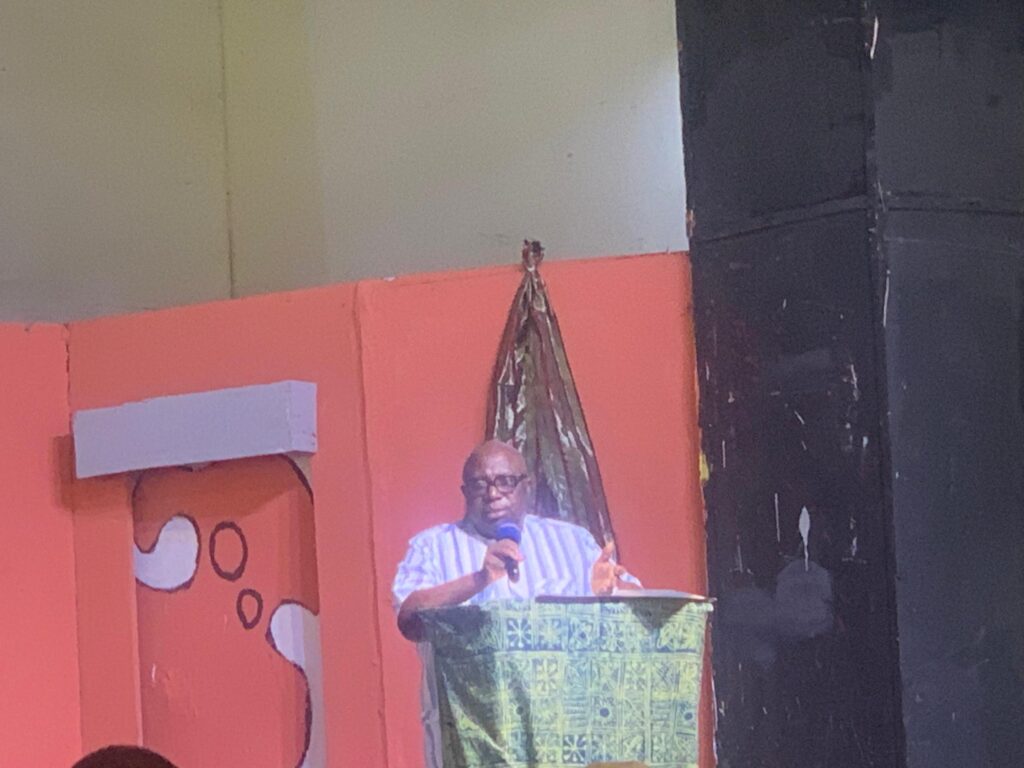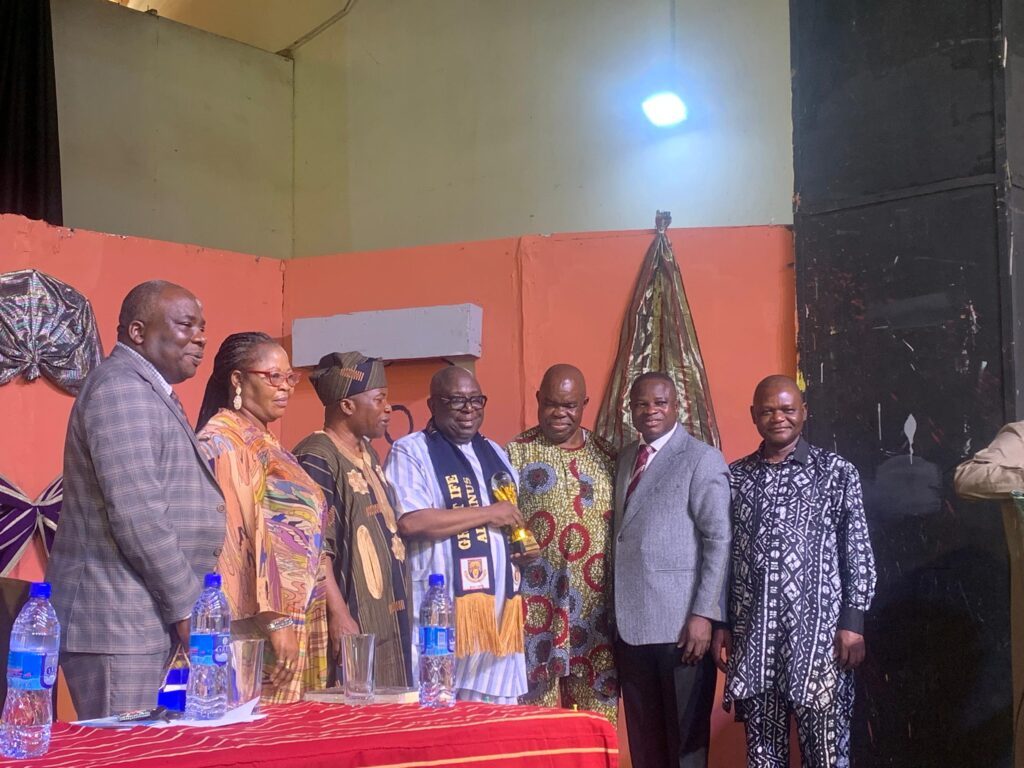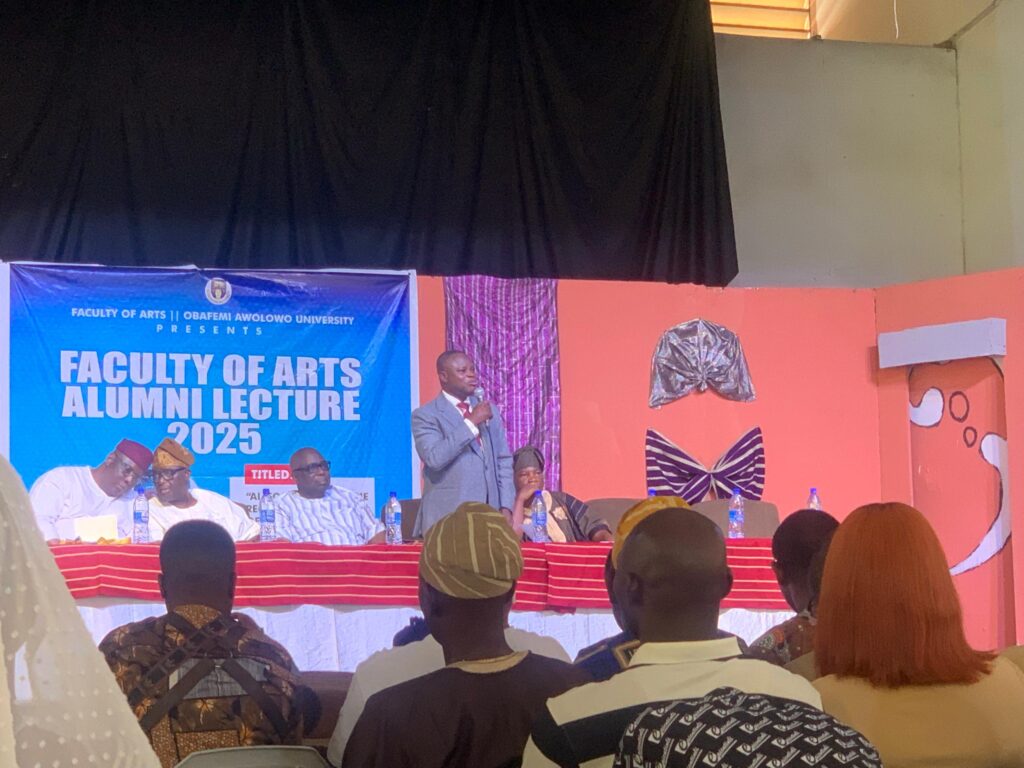The Faculty of Arts Alumni Lecture took place on Tuesday, November 18, at the Pit Theatre, Dramatic Arts, Obafemi Awolowo University. The lecture was themed ‘AI, Social Media & The Reconfiguration of Democratic Power in Nigeria.’
The speaker of the lecture was Dapo Olorunyomi (OON), an alumnus of the faculty, a foremost journalist and publisher of Premium Times, and the chairman of the event was Honourable Idowu Obasa, former General Manager of Independent Communications Ltd (ICNL), publishers of the news outlets PM News and Tempo.
READ ALSO: Reporters’ Diary: Hall Executive Obstructs Reporting of Moremi Fire Incident
Dapo Olorunyomi, a trailblazer in Journalism
Dapo Olorunyomi (OON) is a prominent figure in Nigerian journalism and a fearless trailblazer dedicated to truth, integrity, and press freedom. As the founder of Premium Times, he has transformed investigative journalism in West Africa, empowering a new generation of reporters to courageously expose corruption, injustice, and human rights violations. Known for his calm demeanour and deep intellect, Olorunyomi has faced political persecution but has never wavered in his mission to hold those in power accountable.
His influence extends beyond the newsroom; he is a mentor, a media reform advocate, and a staunch defender of democratic ideals. Through initiatives like the Centre for Journalism Innovation and Development (CJID), he continues to elevate standards for ethical journalism and civic engagement in Africa.
Alumni Lecture
The event also had in attendance the host, Dean of the Faculty of Arts, Professor Gbenga Fasiku, who gave the welcome address. A minute of silence was observed to honour the passing of two lecturers in the faculty, as this was the first public outing after their deaths. He also explained that the reason for the change in venue from Oduduwa Hall was due to renovation activities taking place in the hall ahead of the convocation.
‘The alumni lecture is organised by the faculty to strengthen its ties with former students who have continued to have an impact on the faculty.’ He said. In attendance were Prof. GA Aderonmu, the Deputy Vice-Chancellor (Academics), and the Deputy Vice-Chancellor, Research and Innovations, Professor Akanni Akinyemi. Senator Ojudu was also present at the occasion. The DVC Academics explained that the institution is now looking into interdisciplinary and multidisciplinary reports, and the theme for the lecture is an apt one.
The chairman of the event, Honourable Idowu Obasa, gave his opening remarks. He explained that he was honoured to have been invited to the lecture, even though he is not an alumnus of the Faculty of Arts. He said, ‘Of the four universities I have attended, Ife has had the greatest impact on me.’ He elaborated that Ife is a place where one gets radicalised. He stated, ‘I am proud and happy that I am here.’
He kick-started the sustainable programme of the series. ‘Structures, processes, and procedures are the things that change society,’ he said. He announced, ‘We are starting with a seed fund of 20 million naira.’
Dapo Olorunyomi’s Speech
Dr Mrs O.O. Badejo read the citation for Mr Olorunyomi. Mr Dapo honoured the royal fathers in attendance, the Vice-Chancellor, the Dean, the Chairman of the event, and Senator Ojudu. He explained that artificial intelligence has now become the order of the day and that social media is at the forefront of advancements. ‘In developing countries like Nigeria, the advancement of AI and social media holds promise for how society will be transformed.’ Nonetheless, these also present risks and serious challenges.

He stated further that democratic power is increasingly exercised through struggles over infrastructure and regulation. Debates about data protection, content moderation, platform taxation, and AI policy are, at root, debates about who controls the architectures through which Nigerians see and interpret their world.
He added, ‘This lecture has argued that education and social media are not merely tools used within Nigeria’s democracy; they are transforming the very terrain on which democratic power is organised. By structuring visibility, shaping attention, and mediating knowledge, AI-driven platforms influence who can participate in public life, what kinds of claims gain traction, and how citizens form judgments.’
Mr Dapo added that, taken together, the insights illuminate the central challenge: AI and social media have become the new power, reorganising democratic power in Nigeria by reconfiguring the conditions under which knowledge, perception, and political action are formed. If AI and social media can be reclaimed as instruments of agency rather than engines of manipulation, they may strengthen Nigerian democracy by expanding participation, deepening accountability, and enabling new forms of solidarity.
The reconfiguration of democratic power is already underway. The urgent task before Nigeria is to ensure that this transformation bends towards freedom, justice, and a more thoughtful public life. For that to happen, he posited that our universities will have to embrace a full democratic culture that privileges the primacy of scepticism and debate in every facet of our intellectual journey. Cultivate scepticism, engage in reasoned debate, and sustain that culture.
After Mr Dapo’s speech, gifts from the Vice-Chancellor were presented to Oba Dr Adedokun Abolarin, Orogun of Òkè Ila, who was given an award by the DVC Academics. Kabiyesi Oladunjoye also received gifts from the Vice-Chancellor. Senator Ojudu was presented with an award and gave out 40 copies of his latest book, The Adventures of a Guerrilla Journalist. ‘Let Ife remain what it used to be. Do not let the fire die.’

In addition, Hon. Idowu Obasa, the Chairman, was given an award by the Faculty of Arts and a package from the Vice-Chancellor. Mr Dapo Olorunyomi was also presented with an award by the Faculty of Arts and received gifts from the Vice-Chancellor. After the award presentation, a performance was enacted by the students of the Department of Linguistics and African Languages and the students of Dramatic Arts. Oba Adedokun delivered the closing remarks, stating, ‘Keep the Ife tradition going.’ The Chairman of the Planning Committee delivered a vote of thanks to all distinguished guests present.

